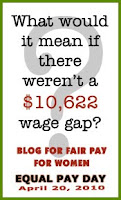Equal Pay Could Equal Eight Months of Groceries
Each year on a Tuesday in April, people across the country (including PathWays PA) celebrate Equal Pay Day, the day when women's earnings finally catch up with men's earnings from the previous year. As we mark Equal Pay Day, it is important to know what the numbers mean, and what effect they have on all families.
Time spent out of the workforce also has an impact on the pay gap, although it is important to note that even when controlling for "hours, occupation, parenthood, and other factors normally associated with pay, college-educated women still earn less than their male peers earn." According to one study, mothers are less likely to be hired and more likely to be offered lower salaries in comparison to fathers and women without children.
The lifetime earnings of mothers are just 38 percent of the lifetime earnings of men- an issue that follows women into retirement. When women lack earnings, they also lack the opportunity to save for retirement through pensions or even savings accounts, and they lack the opportunity to set money aside through Social Security. In Pennsylvania, for instance, the typical single male over 65 in retirement has $3,011 more per year then he needs if he is renting, according to the Pennsylvania Elder Economic Security Initiative. However, the typical single female in the same situation has $5,065 less than what she needs in order to live in her home with dignity. These numbers translate into a $8,076 gap in income between typical Pennsylvania men and women in retirement.
And yes, gender discrimination does play a role in the pay gap, through researchers are divided on how large a role it plays compared to other issues of inequity. A new study of transgender people in the labor force shows that males who transition to females earn 32 percent less than they did previously, while females who transition to males earn 1.5 percent more. Other studies show similar results, including one of symphony orchestra players. When players auditioned behind a screen, women were more likely to be hired than if they were visible during an audition.
So what can you do with all of this information on equal pay? You can contact your legislators regarding the Paycheck Fairness Act- even those who are already supporting the bill need to hear of your support. You can also visit www.wageproject.org to learn how to determine the wage gap at your workplace. If you are an employer, you can also do a self-audit of your company's practices to ensure that you are offering equal pay. Please take a moment today to do one of these activities, or one of the many more that are available!
- If women earned equal wages to their male peers, they could use that money to buy groceries for a family of four for eight months. (The USDA estimates that a family of four spending "liberally" on groceries will spend $264.10 per week. The wage gap per week is $162.)
- Women are the "breadwinner" or "co-breadwinner" in two-thirds of families in the United States, which shows the extent to which families are relying on wages earned by women.
- One year after graduating college, women earn on average only 80 percent of their male counterparts' wages. During the next 10 years, women's wages fall even further behind, dropping to only 69 percent of men's earnings ten years after college.
Time spent out of the workforce also has an impact on the pay gap, although it is important to note that even when controlling for "hours, occupation, parenthood, and other factors normally associated with pay, college-educated women still earn less than their male peers earn." According to one study, mothers are less likely to be hired and more likely to be offered lower salaries in comparison to fathers and women without children.
The lifetime earnings of mothers are just 38 percent of the lifetime earnings of men- an issue that follows women into retirement. When women lack earnings, they also lack the opportunity to save for retirement through pensions or even savings accounts, and they lack the opportunity to set money aside through Social Security. In Pennsylvania, for instance, the typical single male over 65 in retirement has $3,011 more per year then he needs if he is renting, according to the Pennsylvania Elder Economic Security Initiative. However, the typical single female in the same situation has $5,065 less than what she needs in order to live in her home with dignity. These numbers translate into a $8,076 gap in income between typical Pennsylvania men and women in retirement.
And yes, gender discrimination does play a role in the pay gap, through researchers are divided on how large a role it plays compared to other issues of inequity. A new study of transgender people in the labor force shows that males who transition to females earn 32 percent less than they did previously, while females who transition to males earn 1.5 percent more. Other studies show similar results, including one of symphony orchestra players. When players auditioned behind a screen, women were more likely to be hired than if they were visible during an audition.
So what can you do with all of this information on equal pay? You can contact your legislators regarding the Paycheck Fairness Act- even those who are already supporting the bill need to hear of your support. You can also visit www.wageproject.org to learn how to determine the wage gap at your workplace. If you are an employer, you can also do a self-audit of your company's practices to ensure that you are offering equal pay. Please take a moment today to do one of these activities, or one of the many more that are available!



Comments
Post a Comment